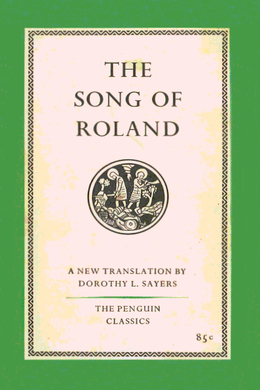
-
EPUB 241 KB
-
Kindle 302 KB
-
Support epubBooks by making a small $2.99 PayPal donation purchase.
This work is available for countries where copyright is Life+70 or less.
Description
On 15 August 778, Charlemagne’s army was returning from a successful expedition against Saracen Spain when its rearguard was ambushed in a remote Pyrenean pass. Out of this skirmish arose a stirring tale of war, which was recorded in the oldest extant epic poem in French. The Song of Roland, written by an unknown poet, tells of Charlemagne’s warrior nephew, Lord of the Breton Marches, who valiantly leads his men into battle against the Saracens, but dies in the massacre, defiant to the end. In majestic verses, the battle becomes a symbolic struggle between Christianity and paganism, while Roland’s last stand is the ultimate expression of honour and feudal values of twelfth-century France. Nowhere in literature is the medieval code of chivalry more perfectly expressed than in this masterly & exciting poem, translated here by Dorothy L. Sayers, an expert in medieval literature perhaps best know for her sixteen crime novels.
204 pages with a reading time of ~3.25 hours (51091 words), and first published in 1957. This DRM-Free edition published by epubBooks, 2015.
Community Reviews
There are currently no other reviews for this book.
Excerpt
In the year 777, a deputation of Saracen princes from Spain came to the Emperor Charlemagne to request his assistance against certain enemies of theirs, also of the Moslem faith. Charlemagne, who was already engaged in a war against the Saxons, nevertheless accepted their invitation, and, after placing garrisons to fortify his frontiers, marched into Spain with all his available forces. He divided his army into two parts, one of which crossed the eastern Pyrenees in the direction of Gerona; the other, under his own command, crossed the Basque Pyrenees and was directed upon Pampeluna. Both cities fell, and the two armies joined forces before Saragossa, which they besieged without success. A fresh outbreak of hostilities by the Saxons obliged Charlemagne to abandon the Spanish expedition. As he was repassing the Pyrenees, the rear-guard of his army was set upon by a treacherous party of Basques, who had disposed an ambuscade along the high wooded sides of the ravine which forms the pass. Taking advantage of the lie of the land and of the lightness of their armour, they fell upon the rear-guard, slaughtered them to a man, pillaged the baggage-train, and dispersed under cover of the falling night. The chronicler Eginhardt, who recounts this sober piece of history in his Vita Caroli, written about 830, concludes: “In the action were killed Eggihard the king’s seneschal, Anselm count of the palace, and Roland duke of the Marches of Brittany, together with a great many more.” Another manuscript of the ninth century contains an epitaph in Latin verse upon the seneschal Eggihard, which furnishes us with the date of the battle, 15 August 778. The episode is mentioned again in 840 by another chronicler, who, after briefly summarising the account given in the Vita Caroli, adds that, since the names of the fallen are already on record, he need not repeat them in his account.
After this, the tale of Roncevaux appears to go underground for some two hundred years. When it again comes to the surface, it has undergone a transformation which might astonish us if we had not seen much the same thing happen to the tale of the wars of King Arthur. The magic of legend has been at work, and the small historic event has swollen to a vast epic of heroic proportions and strong ideological significance. Charlemagne, who was 38 at the time of his expedition into Spain, has become a great hieratic figure, 200 years old, the snowy-bearded king, the sacred Emperor, the Champion of Christendom against the Saracens, the war-lord whose conquests extend throughout the civilised world. The expedition itself has become a major episode in the great conflict between Cross and Crescent, and the marauding Basques have been changed and magnified into an enormous army of many thousand Saracens. The names of Eggihardt and Anselm have disappeared from the rear-guard; Roland remains; he is now the Emperor’s nephew, the “right hand of his body”, the greatest warrior in the world, possessed of supernatural strength and powers and hero of innumerable marvellous exploits; and he is accompanied by his close companion Oliver, and by the other Ten Peers, a chosen band of superlatively valorous knights, the flower of French chivalry. The ambuscade which delivers them up to massacre is still the result of treachery on the Frankish side; but it now derives from a deep-laid plot between the Saracen king Marsilion and Count Ganelon, a noble of France, Roland’s own stepfather; and the whole object of the conspiracy is the destruction of Roland himself and the Peers. The establishment of this conspiracy is explained by Ganelon’s furious jealousy of his stepson, worked out with a sense of drama, a sense of character, and a psychological plausibility which, in its own kind, may sustain a comparison with the twisted malignancy of Iago. In short, beginning with a historical military disaster of a familiar kind and comparatively small importance, we have somehow in the course of two centuries achieved a masterpiece of epic drama—we have arrived at the Song of Roland.
